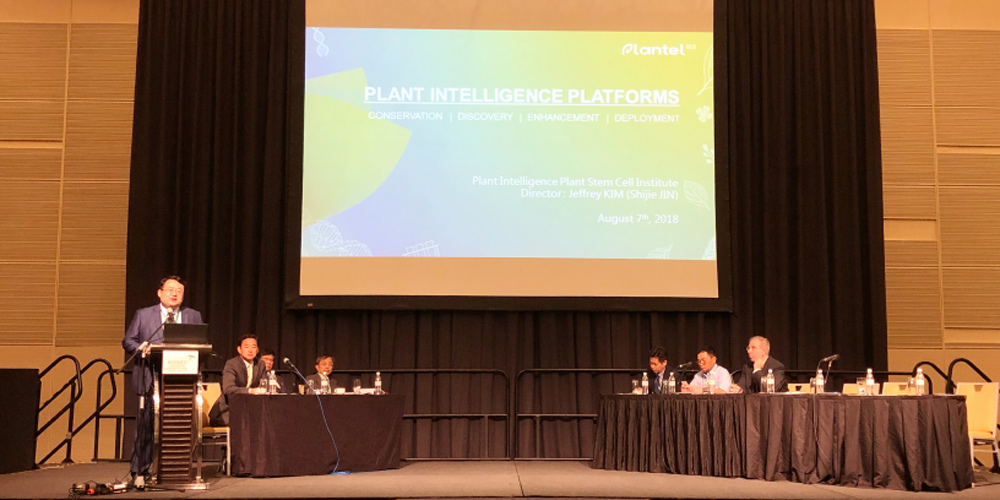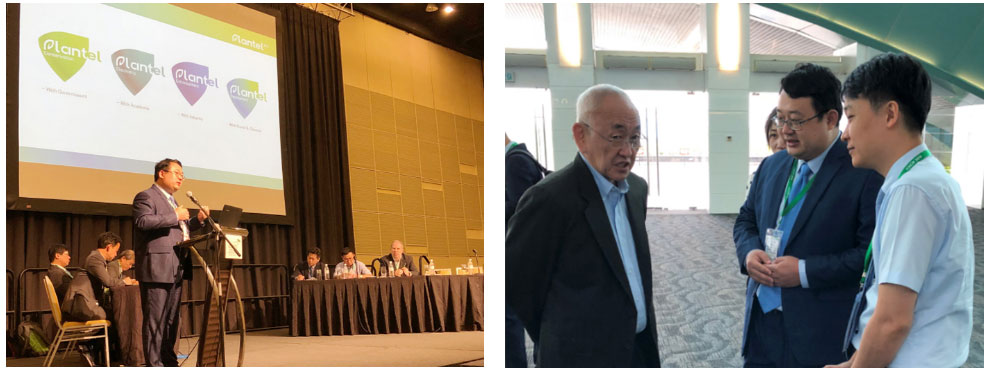PIPSCI has become a life member of the Consortium for the Globalization of Chinese Medicine (CGCM).
From August 8th to 11th, 2017, the 17th Conference of Chinese Medicine Globalization Alliance (CGCM) was successfully held in Kuching, Sarawak, Malaysia. The conference aims to build an academic exchange platform for scholars, companies and units in different regions of the world to share the latest developments in the field of Chinese medicine and promote cooperation among them. At the CGCM Board of Directors of this conference, PIPSCI was officially recognized as a Lifetime Member of the Chinese Medicine Globalization Alliance. It is understood that the first domestic plant stem cell production base based on the plant technology platform of the plant will be landed in Guangdong, China. Once completed, it will become the world's largest cell culture base, effectively promoting domestic food, beauty products, pharmaceuticals and other downstream. The technology upgrade of the industry has improved.
In the future, Chinese medicine and Western medicine are expected to merge together to benefit all mankind.
It is reported that the 17th session of the alliance for the globalization of traditional Chinese medicine (CGCM) was organized by the CGCM committee and organized by the Malaysian Institute of Pharmaceuticals & Nutraceuticals (IPharm) and the National Institutes of Biotechnology Malaysia (NIBM). At the meeting, Shijie Jin, the director of PIPSCI, was invited to give a keynote speech entitled “Plant Intelligence Platform”, and introduced the research and development of plant stem cell platform technology carried out by PIPSCI to experts from all over the world nand the impact of applications on the Chinese medicine industry.
At the CGCM Board of Directors of this conference, Shenzhen PIPSCI was officially recognized as a Lifetime Member of the Chinese Medicine Globalization Alliance. Previously, it became the executive vice at the Shenzhen Health Industry Development Promotion Association. At the same time, the commercial incubation platform of PIPSCI, the parent company of Shenzhen Plant Intelligence Technology Limited, which is called 'Plant Intelligence Holdings Co., Ltd.' has also been accepted as one of the few industry members of Consortium for the Globalization of Chinese Medicine (CGCM).

It is understood that the Consortium for the Globalization of Chinese Medicine (CGCM) is a global, non-profit, non-racial, non-politicized organization that promotes Chinese medicine through the joint efforts of academic institutions, enterprises and regulatory agencies worldwide. And acupuncture culture to promote the globalization of Chinese medicine and benefit all mankind.
Founded in 2003, CGCM was initiated by Prof. Yung-Chi Cheng from Pharmacology, Yale University. There are currently 155 members and 20 corporate members located in different parts of the world. CGCM holds an annual academic conference to provide members and VIPs from all over the world with an industry academic exchange platform focusing on various fields of Chinese medicine, and jointly explore potential research cooperation opportunities. Its founding members include: Academia Sinica, Chinese Academy of Medical Sciences/China Union Medical University, China Academy of Chinese Medical Sciences, Chinese University of Hong Kong, Tsinghua University, Hong Kong University and Yale University.
At the opening ceremony of the conference, Academician Yung-Chi Cheng, Chairman of the Consortium for the Globalization of Chinese Medicine (CGCM), said in his speech that in the past, people kept learning from Western Medicine and gradually ignored Chinese medicine. At this stage, not only are more and more The Chinese have regained the traditional Chinese medicine (Eastern/Chinese Medicine), and more and more foreigners have a strong interest in Chinese medicine. The phenomenon of studying and studying Chinese medicine has become very common.
He said: “In the future, I believe that Chinese medicine and Western medicine will slowly merge into one and become the medical science of ‘W+E=WE’.”
Shijie Jin, director of the PIPSCI, gave a detailed introduction to how to use the plant stem cell series research and development platform and tools to better serve the modernization and globalization of traditional Chinese medicine, including the rare target active ingredients. Defined and reproducible standardized experimental models, rapid R&D services that break the limitations of time and space, seamlessly connected R&D results, mass production platforms, safe and stable natural ingredient production systems, etc.; and the world's first plant that the institute is working hard to build. Plant Stem Cell Bank, what we need to do is to systematically protect, explore, develop and utilize plant intelligence, so that traditional Chinese medicine knowledge and resources can fully realize their potential and let plants bring more benefits to human beings.

The director of PIPSCI, Shijie Jin talked with prof. Yung-Chi Cheng, the Henry Bronson Professor of Pharmacology, Yale University
Power Technology Upgrade World's largest cell culture medium is expected to land in Guangdong
China's plant resources and Chinese medicine culture are rare treasures for all mankind, and the plant stem cell series platform of PIPSCI can enable the whole society to better explore and utilize this treasure house, creating incalculable scale. The value of this; just as a hundred years ago, the Middle East was very barren, and the underground oil was not known for its use and development, but it is now the richest region in the world. Jin Shijie shared in the forum: What the plant should do is to use the world's leading plant stem cell platform technology to develop all kinds of traditional Chinese medicine plants in a completely environmentally friendly way. The series of oil wells and mines that can't be dug, and the more they are dug, make the 'plant intelligence' of Chinese plant resources and the traditional wisdom of traditional Chinese medicine can shine better.
It is understood that at the conference, the technology platform promoted by PIPSCI to the Globalization Alliance of Traditional Chinese Medicine, especially the systematic, large-scale, stable and safe preparation method of rare natural ingredients, has been welcomed and paid attention by experts from all over the world. In addition to a number of well-known institutions, top R&D institutions from Canada, the United States, the
United Kingdom, Malaysia, Hong Kong, China, Taiwan and other countries and regions have clearly expressed their intention to cooperate in research and development, hoping to work together to better use and build a good research to institute a rare research and development and industrialization platform.It is understood that the first domestic plant stem cell production base based on the plant technology platform of PIPSCI will be landed in Guangdong in the near future. Once completed, it will become the world's largest cell culture base for domestic food, beauty products, pharmaceutical and other downstream industries. The technical upgrades have brought huge boosts.
In an interview, Jin Shijie said that in the future, PIPSCI will continue to connect more domestic and foreign R&D institutions, promote the various applications of mature plant stem cell platform technology, and work with domestic and foreign counterparts to make botany, middle The research and commercialization of medicines are accelerating, and we are striving to create a full ecological chain of politics, production, learning, research and use. 'As soon as possible, let the wild plant ginseng and other legendary plant active ingredients fly into the homes of ordinary people and serve the masses of the people. Food, clothing, housing and transportation bring a real qualitative improvement.'